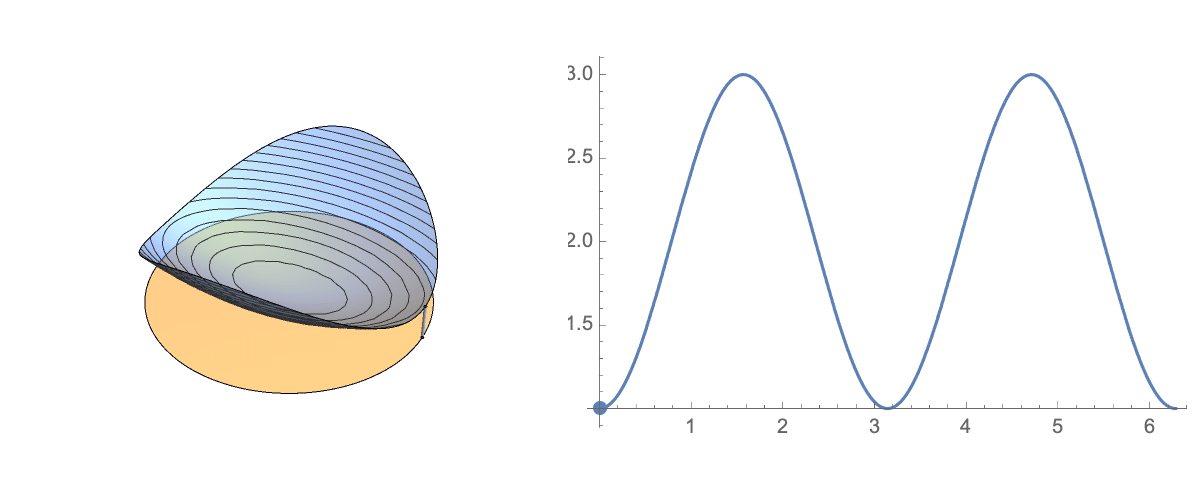Let's start with $m(a)=E[\langle x^2,a\rangle]$ and $s(a)=E[\langle x^2,a\rangle^2]$, so that the variance will be $s(a)-m(a)^2$.
We will calculate these by expressing $x$ in $n$-dimensional spherical coordinates, so
\begin{align}
& & x_1&=\cos(\phi_1)\\
0\ \le\ &\phi_1\le\pi & x_2&=\sin(\phi_1)\cos(\phi_2)\\
0\ \le\ &\phi_2\le\pi & x_3&=\sin(\phi_1)\sin(\phi_2)\cos(\phi_3)\\
&\vdots & \vdots\\
0\ \le\ & \phi_{n-1}\le\pi & x_{n-1}&=\sin(\phi_1)\cdots\sin(\phi_{n-2})\cos(\phi_{n-1})\\
0\ \le\ &\phi_n\le2\pi & x_n&=\sin(\phi_1)\cdots\sin(\phi_{n-2})\sin(\phi_{n-1})\\
\end{align}
and the element of $n-1$-dimensional surface area is
$$dS = \sin^{n-2}(\phi_1)\sin^{n-3}(\phi_2)\cdots \sin(\phi_{n-2})\ d\phi_1\, d\phi_2 \cdots d\phi_n$$
We begin with some special cases, letting
$b_i$ be the vector that agrees with $a$ on the $i^{th}$ coordinate and is zero elsewhere. First,
\begin{align}
m(b_1)&=\frac
{\int\cdots\int a_1\cos^2(\phi_1)\, dS}
{\int\cdots\int dS}\\
&=\frac{\int a_1\cos^2(\phi_1)\sin^{n-2}(\phi_1)\,d\phi_1}{\int \sin^{n-2}(\phi_1)\,d\phi_1}\\
&=a_1\left(1-\frac{\int \sin^n(\phi_1)\,d\phi_1}
{\int \sin^{n-2}(\phi_1)\,d\phi_1}\right)\\
&=a_1\left(1-\frac{n-1}{n}\right)\\
&=a_1/n
\end{align}
where the integrals over higher $\phi_i$ cancel, and the final ratio uses integration by parts.
Since $m$ must be symmetric in all the coordinates, we get
\begin{align}
m(b_i)&=b_i/n\\
m(a)=m\left(\sum b_i\right)&=\sum m(b_i)=\frac{1}{n}\sum a_i
\end{align}
Similarly,
\begin{align}
s(b_i)&=3a_i^2/(n^2+2n)\\
s(b_i+b_j)-s(b_i)-s(b_j)&=2a_ia_j/(n^2+2n)
\end{align}
Now by the polynomial identity
$$\left(\sum x_i\right)^2=\sum_i x_i^2+\sum_{i<j} \left((x_i+x_j)^2 - x_i^2-x_j^2\right)$$
we also have
\begin{align}
s(a)
&=s\left(\sum b_i\right)\\
&=\sum_i s(b_i)+\sum_{i<j}\left(s(b_i+b_j)-s(b_i)-s(b_j)\right)\\
&=\sum_i \frac{3a_i^2}{n^2+2n}+\sum_{i<j}\frac{2a_ia_j}{n^2+2n}
\end{align}
So finally, the variance is
\begin{align}
v&=s(a)-m(a)^2\\
&=\sum_{i}a_i^2\left(\frac{3}{n^2+2n}-\frac{1}{n^2}\right) + \sum_{i<j} a_ia_j\left(\frac{2}{n^2+2n}-\frac{2}{n^2}\right)\\
&=\frac{2}{n^2(n+2)}\left((n-1)\sum_{i}a_i^2 - 2\sum_{i<j} a_ia_j\right)\\
&=\frac{2}{n^2(n+2)}\sum_{i<j}(a_i-a_j)^2
\end{align}

